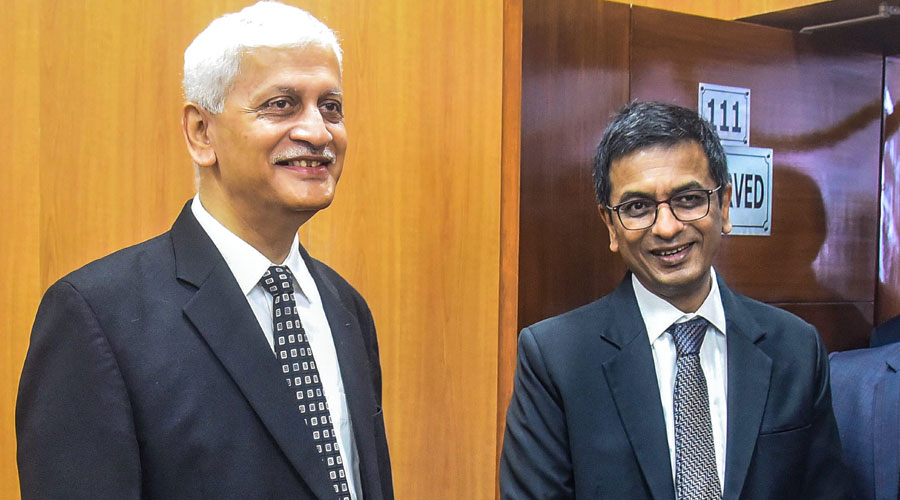Chief Justice of India U U Lalit on Tuesday recommended to the Centre the name of the senior-most Supreme Court judge Justice Dhananjaya Y Chandrachud as his successor.
Justice Chandrachud, who has been part of several Constitution benches and landmark verdicts of the top court including on matters relating to the Ayodhya land dispute, right to privacy and adultery, will become the 50th CJI on November 9 once the recommendation is accepted by the government.
Justice Chandrachud, who was elevated to the top court on May 13, 2016, will have a tenure of two years as the CJI and is due to retire on November 10, 2024. Supreme Court judges retire at the age of 65.
Setting in motion the process of appointment of the next CJI, the incumbent Chief Justice handed over the copy of his letter of recommendation to Justice Chandrachud, who is the son of the longest serving CJI Y V Chandrachud. The former CJI was the head of the judiciary from February 22, 1978 to July 11, 1985.
On October 7, Law Minister Kiren Rijiju had sent a letter to CJI Lalit, who is set to retire on November 8, to recommend his successor. CJI Lalit will have a short tenure of 74 days.
CJI Lalit, who wrote back to Rijiju recommending the name of Justice Chandrachud, requested all the judges of the apex court to assemble at the judges' lounge at 10.15 AM. He then handed over the letter designating the successor to Justice Chandrachud, who has also played a pivotal role in digitization of the judiciary,
According to the Memorandum of Procedure (MoP), which governs the process of appointment of judges in the higher judiciary, the outgoing CJI initiates the process of naming the successor after getting a communication from the Law ministry.
The MoP says the senior-most judge of the apex court is considered fit to hold the office of the CJI and the views of the outgoing head of the judiciary have to be sought "at an appropriate time".
The MoP, however, does not specify the time limit for the initiation of the process of recommending the name of the successor CJI.
Justice Chandrachud was also part of the benches which delivered path-breaking judgements on decriminalising same-sex relations after it partially struck down Section 377 of the IPC, validity of the Aadhaar scheme and Sabarimala issue. Recently, a bench headed by him expanded the scope of the Medical Termination of Pregnancy(MTP) Act and the corresponding rules to include unmarried women for abortion between 20-24 weeks of pregnancy.
The Justice Chandrachud-led bench had also passed several directions to assuage the miseries faced by people during the COVID-19 crisis, terming the brutal second wave of the pandemic last year as a "national crisis".
Recently, Justice Chandrachud was among the two judges of the apex court Collegium which had objected to the method of "circulation" adopted for eliciting the views of its members on the appointment of judges to the top court.
He was judge of the Bombay High Court from March 29, 2000 until his appointment as the Chief Justice of the Allahabad High Court from October 31, 2013.
Justice Chandrachud was designated as a senior advocate by the Bombay High Court in June 1998 and became Additional Solicitor General in the same year till his appointment as a judge.
After completing BA with Honours in Economics from St Stephen's College, New Delhi, Justice Chandrachud did his LLB from Campus Law Centre, Delhi University, and obtained LLM degree and a Doctorate in Juridical Sciences (SJD) from Harvard Law School, USA.
He practised law at the Supreme Court and the Bombay High Court and was a visiting professor of comparative Constitutional law at the University of Mumbai.











